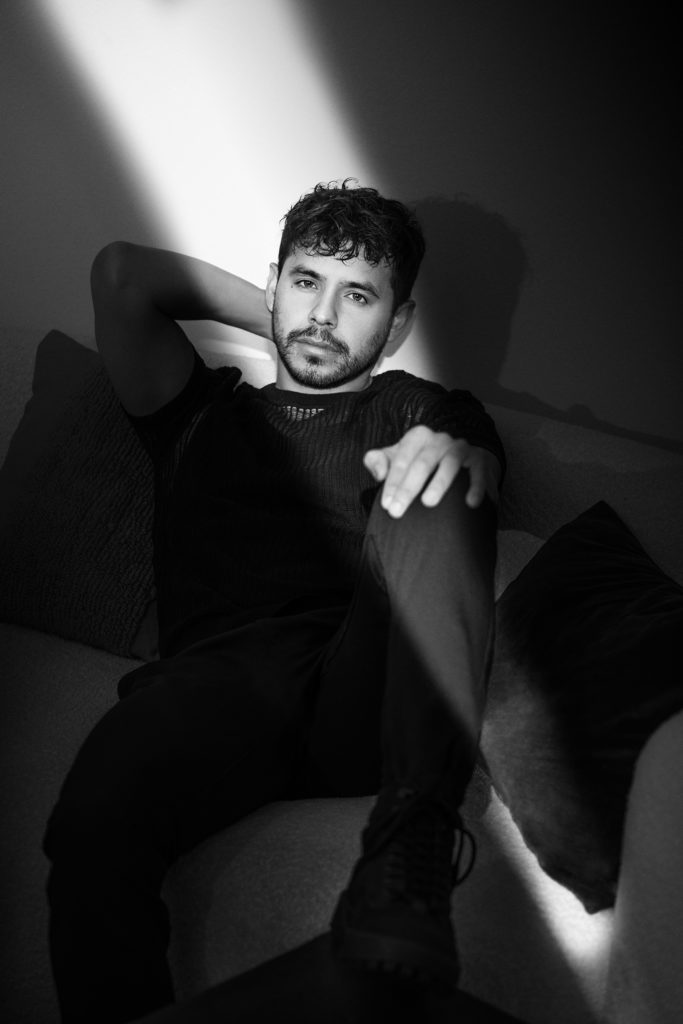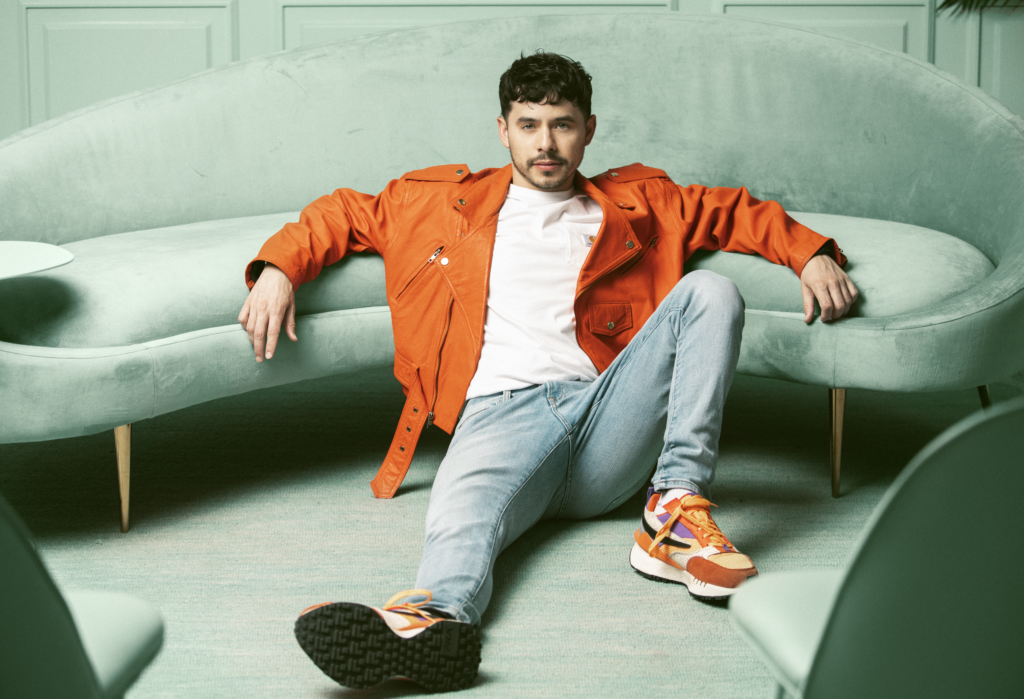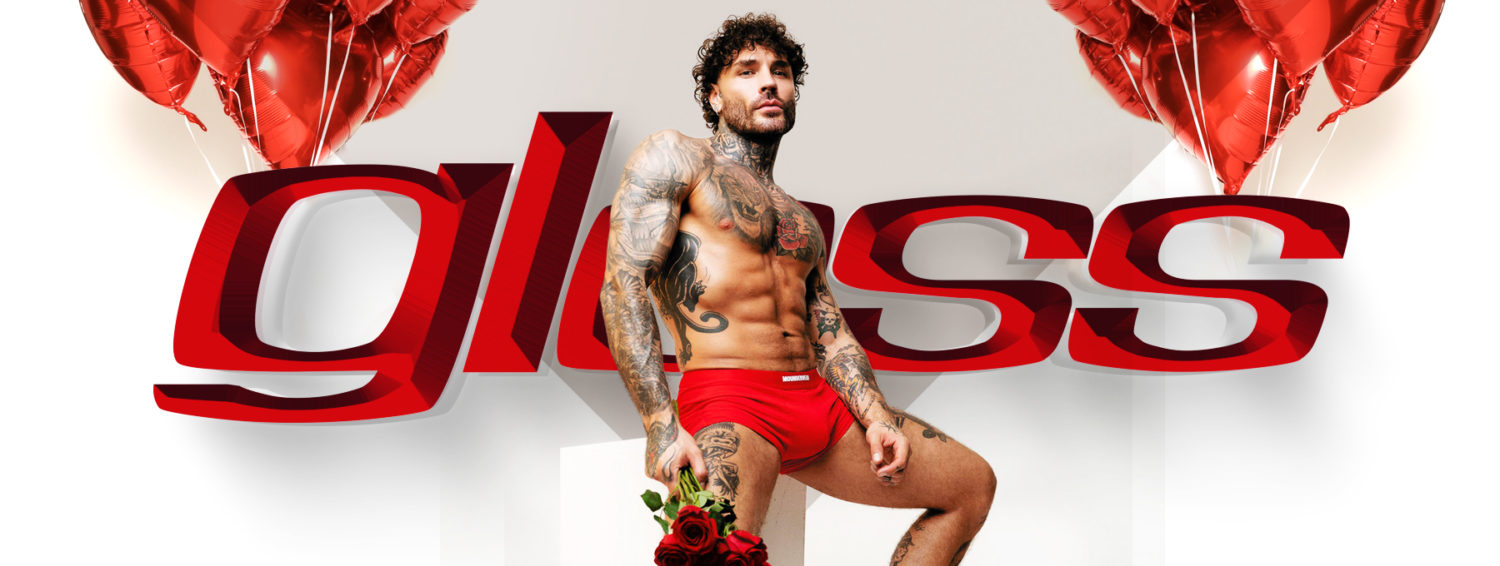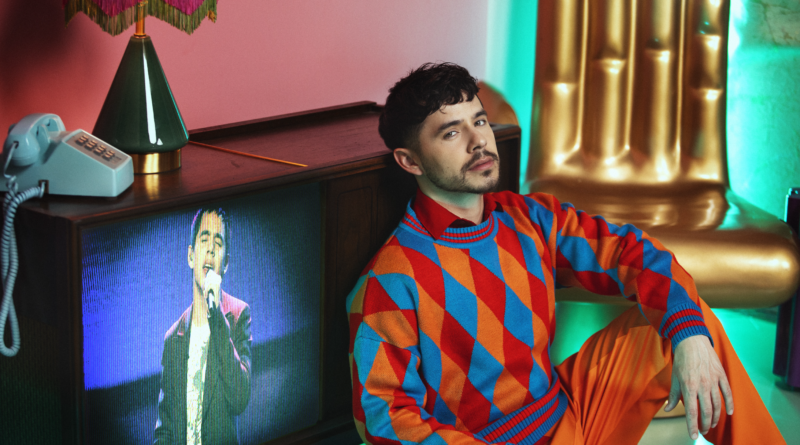The ‘Idol’ We Need Now
How David Archuleta left behind the Mormon church to flourish as an openly queer person
By Chris Azzopardi
When David Archuleta returned to the “American Idol” stage in April, he knew that singing his latest single, “Hell Together,” which he wrote about his mother’s show of unconditional allyship after he came out in 2021 and left the Mormon church (so did she, in solidarity), wouldn’t be embraced by everyone. But he sang it anyway, his pro-queer message heard loud and clear by those who are closeted and afraid, like he once was, and who still need it most — LGBTQ+ youth.
Archuleta wasn’t even close to being out in 2008, during the seventh season of “American Idol,” when his kind smile and puppy-dog eyes told a very different story than the open and honest one he’s been sharing through his candid thoughts and personal music. He told People magazine in 2022 that he would pray to God to “please take this away from me because I don’t know what else to do.” He only got frustrated when he spoke to church leaders about Mormonism’s views on the LGBTQ+ community. And then, at 30, after spending most of his life as a devout member of the Church of Jesus Christ of Latter-day Saints, which he has since abandoned, he came out publicly.
With years of severe anxiety attacks and suicidal thoughts behind him, Archuleta is doing what so many of us feel compelled to do when we’ve been condemned and felt betrayed by our faith communities: sharing his story with authenticity and vulnerability and standing as a beacon of hope and empowerment for those who are still finding their way to their truest selves. He’s giving his voice in more ways than one, too. As a singer, he’s hopeful that “Hell Together” — inspired by an exchange he had with his mother who texted him and said, “If you’re going to hell, we are all going to hell with you,” he explained in an Instagram post — will inspire other parents to be wholehearted allies to their queer children.
Recently, I spoke with Archuleta, 33, about performing the emotional song on the “Idol” stage, his advice for queer youth torn between authenticity and religion, and why he identifies with his younger self now more than ever.
 How did it feel to be on the “Idol” stage again all these years later, but this time as almost a completely different person in some ways? You got to step back on that stage as an openly queer person and express being openly queer.
How did it feel to be on the “Idol” stage again all these years later, but this time as almost a completely different person in some ways? You got to step back on that stage as an openly queer person and express being openly queer.
It was invigorating. It’s just nice to be able to feel like you can just lay all yourself out there when so many people feel, and still feel, like you should hide. So just to be back on the “Idol” stage and be able to be there now that I’ve come out, like you said, even wearing mesh, it’s nice to be able to feel like you can lay all yourself out there in the open, in front of people without having to feel the need to hide. And people still feel like you should hide. They’ll say, “Well, don’t talk about it. Don’t show yourself. Can’t you just keep it to yourself?” So you have to be open about it. You have to talk about it because you have to show people “I’m here. What are you going to do about it? You can’t hide me.” And they try to, because it makes them uncomfortable.
When I hear you sing “Hell Together,” those feelings are still so raw for you it seems, and it’s such an important song that you’re releasing. As a kid who struggled with my sexuality while growing up Catholic, it would’ve changed my life had I heard that song in my teen years. And as an adult, I realize there are so many young people who need to still hear the message of this song. Was that on your mind while working on it?
Yeah, because when I came out, I had thousands of people, even to this day, still in the closet — all ages, people who are still married, people who are young, teenagers, people about to go on missions for their church — all saying, “I’m like you and I don’t know what to do.” That was the biggest motivating factor for me to write a book, because I’m writing a book now. I am trying to live my life authentically, but also I want to do it in a way that keeps the conversation going. I don’t want it to just be a middle finger to conservative people. There’s too many people like me still in that community who don’t know how to find their way. They don’t know how to get out of that. And they don’t have a safe way to get out of that. I think a lot of people who are out and now part of the queer community, they know how that struggle is. And a lot of people who find their way into the queer community, they have to be tough. They have to be thick-skinned, they have to be fighters, but not everyone knows how to do that. Songs like “Hell Together” and other artists who’ve written songs that are similar to that, I think it’s like, I want to start that conversation. “American Idol” was not the place I saw myself singing a song about going to hell together and about coming out, because that’s not the audience that is OK with that. It shows in a lot of the comments. “‘American Idol’ is still a very family, middle America Christian-conservative audience for the most part, and they’re not OK with that kind of stuff.
So you have to start in a very uncomfortable conversation with people who don’t want that conversation. But you know what? If there’s a little queer person who is on the couch with their family watching this, and if they hear their parents saying, “Ugh, that’s so gross that he would sing that song,” I hope that they see that there is a mother out there like my mom, who wasn’t OK with me coming out at first. I had to have hard conversations with her. Sometimes you have to find a way; you have to help them understand and say, “This is what I’ve had to go through.” I know it’s hard, but try to have a hard conversation and say, “Mom, Dad, I want you to listen to what I’ve had to deal with and why, and the pain I’ve had to go through and the torture of not being able to change who I am because this is what I am, and who I am. And I need you to understand why I’m coming out.” That’s a hard conversation to have and not everyone’s ready. But do what is going to help you feel like you can thrive and prosper and be happy.
You knew that performing this song would be somewhat controversial given the show you were performing it on. What went through your mind as you were singing?
I was scared. It’s uncomfortable. And I was nervous, not just because of the song, but also the fact that it’s a hard song to sing vocally, and I’m on a singing competition show that I once was a singing person on, singing a song that I knew was going to have very mixed reviews by the people who are watching it. But at the same time, it was so refreshing. Because again, I don’t have to hide this about me. I don’t have to just present myself in a way that is acceptable to people who would judge me normally. If you just judge me, then go ahead and do it in my face. Because I’m not going to do this anymore behind closed doors. This is just who I am, and that’s fine. So it was nice. Singing a song like “Hell Together” on a family show, “American Idol,” it’s like, in the end, it is a song about family. And sometimes I think people overlook that. But it literally is a song about a mom showing her support and learning how to support her son. I love my mom. I’m grateful because not everyone’s parents are like that. Hopefully by sharing her story and what she said can be something that other parents in the future or now can have in mind when they have a kid going through a similar thing.
Controversy aside, there’s been an outpouring of support for this performance as well, and some commenters are even admiring your chest in the mesh.
Oh my gosh. That’s so funny. Here I’m going all deep and stuff, and gay Twitter’s not even thinking about that, oh my gosh. That’s hilarious. I mean, I didn’t look at that as the focus. It was just like, I feel good in this, so I’m going to wear it. And that’s what I think. My mind was totally taken by the controversy. I’m still getting comments. I’m still getting people trying to rebuke me and save me, and shake their finger and say, “How dare you,” defending their beliefs. So that stuff takes more of my attention. I guess the gay guys have been commenting on my body, so maybe that’s also why I haven’t noticed. It’s nothing new, whereas singing a song about going to hell together in front of a conservative audience of millions of people was more…
Pressure?
It was just more like that’s what took my attention, I guess, and pressure. But hey, I’m glad. If it’s positive that they’re commenting about that, then great.
You don’t go to the gym for nothing.
I’ve been working out, and I don’t go to the gym for nothing, no. I like to show off what I’ve worked hard for.
What did it mean to you to be named Outstanding Breakthrough Artist by GLAAD this year?
Oh, that took me so off guard. I wasn’t expecting it at all. Because Ice Spice was literally in the category, so I was like, if Ice Spice doesn’t get it, it’s going to be someone else other than me. But I was like, there’s no way in hell I’m going to get this. So I was just minding my own business. I’m like, it’s cool that I was nominated and my jaw dropped when [they called my name]. I’m like, “What? What?” I was so confused, but I was so happy as well. And by winning the award, I was able to go backstage and I got to say hi to Reneé Rapp, and I was like, “I love you. You’re an amazing singer.” She’s like, “Wait, I’m obsessed with you.”
With Pride on the horizon, how do you reflect on your journey and what this time of year means to you and the rest of the queer community?
It’s so exhilarating and invigorating. Pride is a thing that I’ve now embraced; I was afraid of it before. Because I’m like, oh, Pride is so loud and colorful, and in your face. Now I’m just like, “Oh, I get it now. I see why.” I look forward to it. I’m performing at a lot more Pride things this year, whereas I only performed at one last year and it was my first one, so I can’t wait to keep going. It’s so fun.
You’ll have to expand the mesh collection.
Yeah, I guess I’ll have to maintain at the gym.
Your self-expression is not just through music, but it’s radiating through your style too. I’ve watched your journey from somebody who was more of a button-up GAP kid to really pushing fashion boundaries more. How is what you wear an extension of who you are?
Well, I used to be styled, first by “American Idol,” which was on Fox. It was a conservative family show. And then after that, I was styled by my friend who was a Mormon mom. And I was a Mormon. Now that I’ve come out of that and I don’t have to worry about, “Was this modest enough?” I don’t worry about that anymore. I’m just like, “Do I feel good in this?” And it’s so freeing. It’s so nice to just be able to wear what feels good and what I feel confident in, and what I feel makes a statement. And I’ve invested more money into a stylist. Shout out to Andrew Philip Nguyen. He’s been so fun to work with, and I’ve worked with the other stylists too, and I look forward to collaborating with more photographers and stylists and brands hopefully. Hey, I’ve never had brand deals. I would love to because it’s just another form of expression and creativity, and I love it. It’s a new world to me, and I think it’s really fun.

When you look back at the last few years after coming out, is there a specific moment or experience that made you feel like you made the right decision?
I feel like every day makes me feel that way because a lot of religious people will be like, “Well, we don’t tell gay people to die and stuff,” but the structure and the conversations and the culture builds to a lot of queer people having to choose one or the other. A lot of people feel like to choose religion, they will even have to lay down their own life, [or] even take their own life. And there was a point where I was willing to do that. So for me, being out and living life as a queer person and just living after having done that, when I thought that was going to be the end of the world, and the end of my life. When it was like, that’s when my life began. And for me, every music festival I go to, every rave — I went to Coachella for my first time and just connecting and being there and not having any reservations, just dancing and loving the music — I’ve just loved it. I’ve loved going to festivals because it’s a freeing energy. I just think that if there is a God like the way I’ve been taught, then I thank God I’m alive in this moment because this is just something that makes me thankful to be here, and thankful to be alive and breathing.
Seems like you’re breathing much easier these days.
Thank you. I wasn’t breathing too easily on the “American Idol” stage last night, but otherwise, yes, I would agree.
What has it been like to find queer and ally ex-Mormons in the music community, with Tyler Glenn and Dan Reynolds among them?
It’s been great to do LoveLoud with them. I’ve found a lot more people grew up as Latter-day Saints than I realized. I was talking to my friend, Mikey Angelo, he’s on TikTok, and he does these really funny recap videos. He’s like, “I was a Mormon too.” I was like, “What? You were a Mormon too?” And now we’re both out and we were both jamming at Coachella. I’m like, look at us two ex-Mormons, now out and queer and proud and having a fun time at Coachella.
Would you say you left one community for another community?
Yeah. I feel like, as human beings, we need community. And that’s what was so beautiful about religion: it’s community and you’re there for each other. And so when you leave religion, people think, “Oh, you’ve lost the meaning of life.” It’s like, “No, I just have to find community elsewhere,” and I have meaning for life again. So I think that’s something else, to be encouraging to people who haven’t left religion and haven’t come out, because they’re afraid of losing their community, and feeling like they’ll lose their purpose to live. It’s like, you know what? There is a community elsewhere and it’s beautiful, and it’ll give you a whole new sense of meaning to live, and it’s wonderful.
It seems like you’ve also found a close ally in Paula Abdul, who is a longtime LGBTQ+ ally and who was also a judge during your season of “American Idol.” You two recently reconnected. How has she been an ally to you on this journey?
I love Paula. She’s shown all of her support, and because of that, I wanted to return the favor. And when I got asked to do a tribute for her at the Queerties, and they’re like, “Hey, we’d love for you to do a song,” I was like, “I don’t want to do just one song. I want to do a whole medley, because that’s what she deserves.” And it was so fun to do, and yeah. Thank you, Paula. I love you, Paula.
How did the concept for the “Hell Together” video come about, and also what was it like seeing young David in those family videos? How do you identify with him now?
I totally identify with him because for me, when I was little, there was no judgment toward myself. And so it’s nice to be able to see myself no longer with that judgment because when I started hitting age 11, 12, 13, 14, I hated myself and hated how I looked. Now, being able to see myself and be like, “Oh, I have compassion for myself,” is very healing. And so when I see videos of when I was 6 and 7 years old and then not having any fear of who I am and who I would become is really an empowering moment for me. There are a couple of moments when I was 9 years old that I saw and I knew about being different and I was scared of it, but now being able to just hold myself and be able to show love is really beautiful. And also to just pay tribute to my mom and reminisce. We’re human beings trying to figure out life and be there for each other, just like everyone else in this world is trying to.
Chris Azzopardi is the Editorial Director of Pride Source Media Group and Q Syndicate, the national LGBTQ+ wire service. He has interviewed a multitude of superstars, including Cher, Meryl Streep, Mariah Carey and Beyoncé. His work has also appeared in The New York Times, Vanity Fair, GQ and Billboard. Reach him via Twitter @chrisazzopardi.

